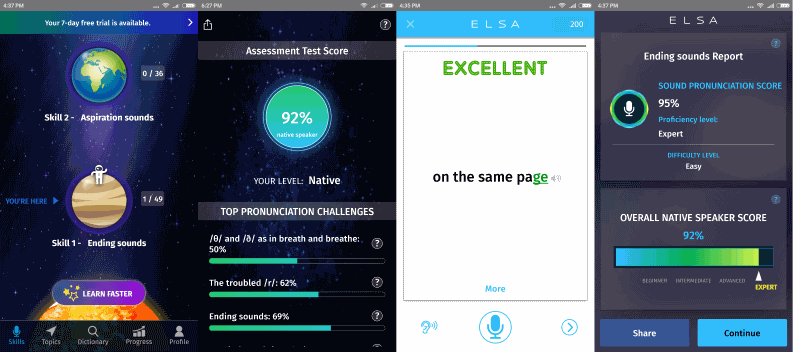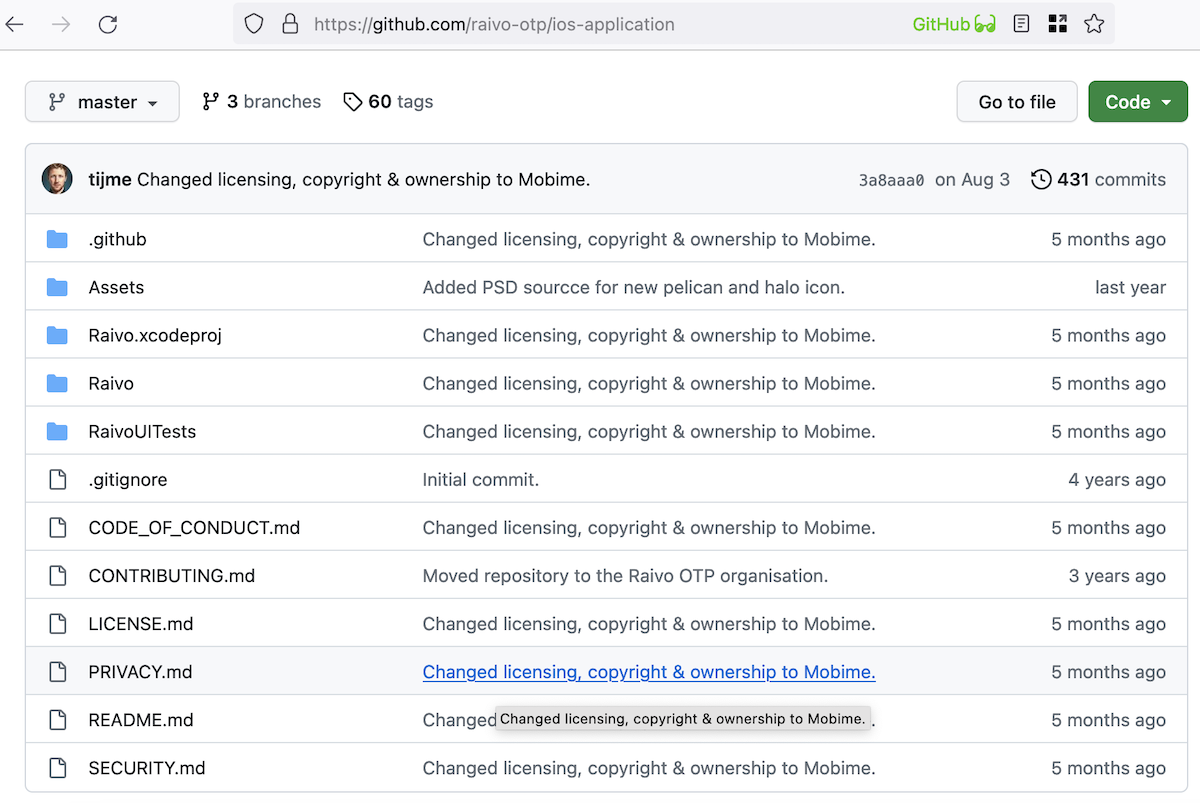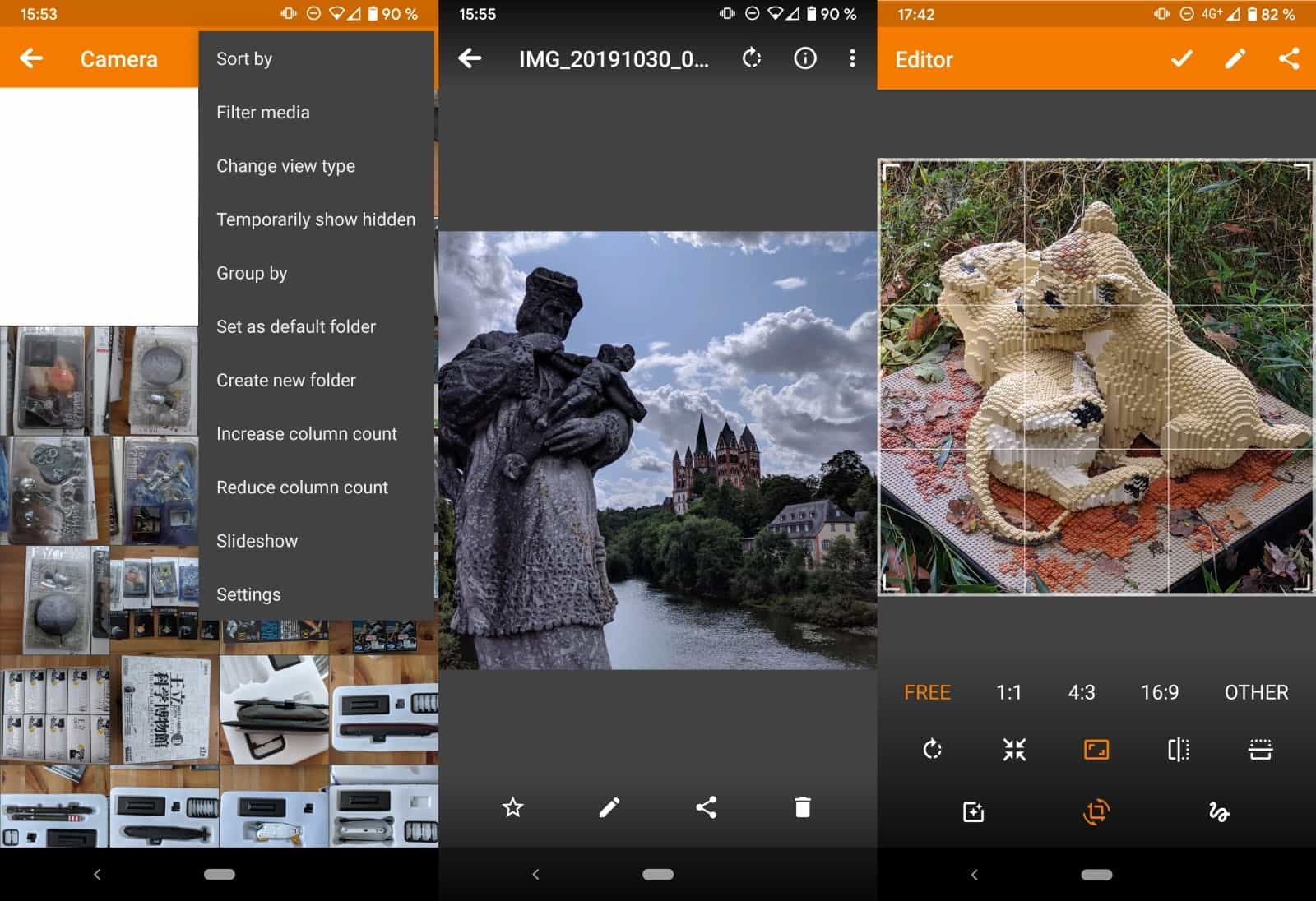Improve your English Pronunciation with ELSA Speak for Android

ELSA Speak: Reduce your accent is a free application for Android (and iOS) that assists you in improving your English pronunciation.
ELSA, which stands for English Language Speech Assistant coaches non-native speakers in improving their (American) English.
The app is free to try but limited. The first two lessons of each training group are free, the remaining ones are unlocked when you subscribe. A free 7-day trial is available that unlocks all lessons during that time period. Pro accounts are available for €31,99 yearly, €9,49 quarterly, or €4,19 monthly.
The app to improve your English pronunciation comes with a test that you can take that analyzes your pronunciation and gives you a native speaker score based on it. ELSA Speak will use the information to create a personalized curriculum based on the test.
ELSA Speak: Reduce your accent
You are asked to read ten text paragraphs aloud using the device's microphone during the test. ELSA Speak analyzes your speech, and gives you a score in the end.
Probably the most interesting aspect of this is that it highlights areas that need improvement. When I ran the test for instance on the Android device, I was told that I could improve my pronunciation of voiced and unvoiced th, the letter r, ending sounds, and w/v.
You can open a detailed report when you swipe down to get the full listing of recommendations. This opens all sentences that you spoke aloud. The words are color coded, with green highlight excellent pronunciation, yellow okay-ish pronunciation, and red problematic pronunciation.
You may play the recording again, or listen to a native speaker reading the paragraphs aloud.
ELSA Speak adjusts the training based on your test results. While you don't need to take the test, it may make sense to do so as you can start working on the main issues right away.
Training comes in several different forms. Probably the most common forms is skills training that focuses either on specific pronunciations or topics.
A skill, say "the /s/ and /sh/ contrast" or "aspiration sounds", consists of multiple levels that you complete one after the other.
Levels are downloaded on demand, but you may also download all levels of a skill right away. Levels may test different language skills, for instance your listening or pronunciation.
The application keeps track of your progress, and you may repeat levels or skills as often as you like.
The two other areas that you may dive in are topics and dictionary. Topics focuses on certain subjects such as career path customer service, family, travel or business. These lead to particular skills again.
Dictionary on the other hand is more of a free form training module. Type what you want to say, and listen to the pronunciation before you speak the sentence or word and get a rating for that.
Verdict
ELSA Speak is a powerful application for English learners who want to work on their accent and pronunciation in general. It is a bit unfortunate that the application is not free, but if you are serious about improving your pronunciation, you may not mind the price as much, especially since you can get it for less than €3 per month if you pay yearly.



























I want to join this program and I hope this will help me
Is English becoming a lingua franca due to computers??
@ Mike J:
My take on the world wide use of English, particularly with computers, is due to legacy factors as follows:
1) The British Empire spread the English language all through out the world e.g., the North American continent, Australia, New Zealand, India, South Africa, etc. Then followed 2) the extensive economic influence of the United States, particularly following WWII which essentially required that the business people from other countries learn to conduct business using English. Then enters 3) computers (primarily developed in the US) and then shortly thereafter the Internet.
Had there been a different sequence of events, let us say, had the Norwegians established an empire as extensive as the British, at approximately the same time in history then no doubt the Norwegian language would be the “lingua franca†of the computer world.
I could be wrong, but those are my thoughts on your observation/question.
Geez, I want Carrie Coon from the recent season of Fargo to take that test.
Or any of her fellow Minnesoootans.
That’s gotta be the prime American English standard, okay then, hon?
;)
this is a great app. martin could certainly use it. his articles barely classify as english.
@ martina,
You just provided a classical example of the old American phrase: “That’s the pot calling the kettle black.”
I could be wrong, but I vaguely remember from first grade that properly written English uses capital letters at the beginning of each sentence. You wrote 3 sentences without any capital letters.
Martin’s written English is exceptionally good considering that it’s a second language. And when consideration is given to the significant number of articles he produces with so few errors one must grant it’s quite an accomplishment.
Now, if you meant to be humorous what you wrote gives no indication of it which, once again, says more about your written English than it does about Martin’s.
1) I write from the Eastern Standard Time zone, where it is several hours before the time indicated in Martina’s comment. Maybe she’s a native speaker of American English, but she’s not writing from North America. (The time printed with my comment is 6 hours ahead of EST time).
2) English grammar occasionally requires capital letters. “this”, “martin”, “his” and “english” should all be capitalized.
3) This app is for spoken English. Unless I’m mistaken, Martin’s articles are written articles.
4) As a native speaker of American English, I can testify that Martin’s articles evince a very high standard of literary English, remarkable for one whose native language is German.
5) It is Martina’s comment which barely qualifies as a comment on the app. It is a tribute to Martin’s courtesy that he allowed it to be published.
A most welcomed application that should be honored by French in particular : even French savvy English speakers have that (delightful) French accent tied to their voice as hard glue! I’m an exception, practically no accent, maybe an English Canadian accent if I believe what a Foreign Legion officer once told me, even if an American girlfriend as for her declared my accent was that of a “preppie” … who to believe?! But that’s another topic, mentioned to illustrate the fact an accent is filled with charm, information, stories, history. Remember “My Fair Lady’?
Personally I love accents, given one remains understandable. They are to a voice what sauce is to spaghetti.
not too shabby (:
imgur.com/a/zT7W9
Btw, has anyone gotten this far (second screenshot)? The first word is “lot”, but the second word definitely isn’t sloth, it’s missing the “th” ending, although it begins with an “s”, lol.
Also, among the few languages that it has for me to choose as my native, I’m surprised it has both Russian and Ukrainian. The “Easy” part I find it to be very easy, and the rest is paid, oh well.. One’s pronunciation does get better, the more you use the language you’re trying to learn. Mine used to be better during high-school and early college days while I was still studying it. But a few days ago, when I was trying to speak with someone in Enlgish, I kind of felt that my pronunciation was a bit off. Well, a bit more than what I knew it was, anyway..